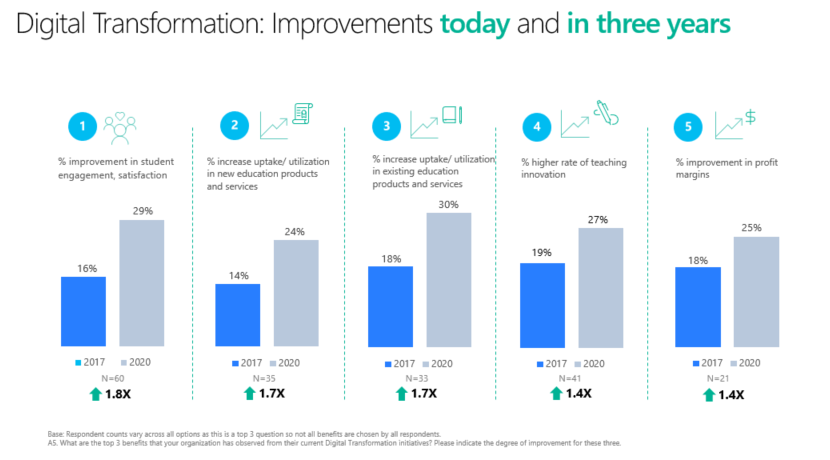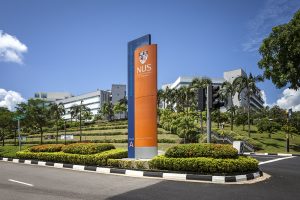- Higher education institutions embracing digital transformation expect to see at least 40% improvement in student engagement, utilization of new and existing education services, and higher rate of teaching innovation in three years.
- While the sector feels that existing curriculum is able to prepare young professionals with future-ready skills, this is in contrast with overall Asia Pacific sentiment where lack of skills and resources is the number one transformation challenge faced by organizations.
Asia Pacific, Singapore, 26 September 2018 – Microsoft today released findings from its Unlocking the Economic Impact of Digital Transformation in Asia Pacific[1] study, specific to the higher education sector. The study found that higher education institutions that have begun their digital transformation journeys are already seeing 14 to 19 percent improvements in areas such as student engagement, utilization of new and existing education products and services, higher rate of teaching innovation and profit margins.
Respondents polled also indicated that they expect to see at least 40% improvement to the top five benefits tracked in three years.

Close to three quarters of respondents in the education sector (72%) feel that existing curriculum and systems can prepare young professionals with future-ready skills to meet the demands of digital transformation. This is in contrast with the overall Asia Pacific sentiment – according to the Study, lack of skills and resources is the number one transformation challenge faced by organizations.
“Education is the bedrock of economies, where a country’s growth is dependent on the skills of workers. In the age of digital disruption, institutions need to go beyond imparting hard skills, and instead focus on developing future skillsets among students. In addition, the profiles of students are changing rapidly – they are digital natives across age groups. Our research shows that leaders in the sector expect positive benefits in student engagement and empowered faculty from a formed digital transformation strategy,” said Larry Nelson, Regional General Manager, Education, Microsoft Asia.
Addressing Education Disruption by Embracing Education Transformation
The study found that higher education institutions are concerned with how technology is changing students’ consumption habits rapidly; the need to improve curriculum quality and relevance, and new disruptive players in market.
“The rise of digital-first and alternative institutions are offering students more choices in their learning journey and may well become substitutes for conventional schools. Hence, it is encouraging to see that leaders in the higher education space realize the need to embrace a 360-degree transformation to stay competitive, whereby establishing the culture of innovation and continuous learning is the number one priority for respondents,” added Nelson.
Other priorities identified included the need to gain a holistic view of students, staff, partners and suppliers, as well as to improve institutional agility in responding to fast-moving trends and opportunities.
To embrace education transformation, institutions need to establish a holistic vision and integrate multiple tools and data into a single, intelligent system. This requires leaders in the sector to embrace 21st century education goals. They include:
- Enabling lifelong learning among all students;
- Creating connected experiences both on- and off-campus;
- Unlocking limitless research capabilities, and finally,
- Developing effective institutions that can address fast-changing market demands.
 In Singapore, the National University of Singapore (NUS) will collaborate with Microsoft to harness the power of the Microsoft Academic Graph (MAG), hosted on Azure, to bolster its research and innovation capabilities. MAG is an open and heterogeneous graph containing scientific publication records, citation relationships between those publications, as well as authors, institutions, journals, conferences, and fields of study. NUS aims to leverage both MAG and AI technology to extract and analyse knowledge embedded in the publications’ data. In addition, researchers from the NUS School of Computing will use MAG to conduct healthcare-related research.
In Singapore, the National University of Singapore (NUS) will collaborate with Microsoft to harness the power of the Microsoft Academic Graph (MAG), hosted on Azure, to bolster its research and innovation capabilities. MAG is an open and heterogeneous graph containing scientific publication records, citation relationships between those publications, as well as authors, institutions, journals, conferences, and fields of study. NUS aims to leverage both MAG and AI technology to extract and analyse knowledge embedded in the publications’ data. In addition, researchers from the NUS School of Computing will use MAG to conduct healthcare-related research.
Through the power of AI and machine learning, MAG can infer query intent and retrieve the most knowledge while recommending new materials that are unbeknownst to the users. This solution will help the researchers address the chronic issue of information overload, streamline research processes and glean better insights.
Professor Tan Eng Chye, President of the National University of Singapore, said: “This collaboration with Microsoft will accelerate our AI capabilities, empower our researchers and encourage innovation. We are thrilled to see how this cooperation can further improve our research productivity as well as boost our ability to develop and deliver better solutions to address the critical and complex issues that are relevant to Singapore, Asia and beyond.”
Unlocking 21st Century Education Outcomes through Data Investments
For any institutions to be successful in digital transformation, they must have a digital footprint to start. Data is a critical ingredient for unlocking the digital potential of higher education institutions, especially with existing volume of data that is available.
Data can transform infrastructure development
With data, institutions can create more effective operations to deliver better student and staff experiences. For example, by using existing information, institutions can establish digital Learning Management Systems which will allow for instantaneous and personalized delivery of educational courses, as well as more effective administration. In addition, when institutions collect data in a structured manner, they can enable better student lifecycle management, which will result in improved student engagement. Lastly, data can help develop intelligent campuses with the use of connected devices and the Internet of Things to enable better facilities management, and even effect distant learning capabilities.
Data can also improve learning outcomes
As student profiles change, there is a more immediate need to deliver personalized learning experiences. With data, educators can tailor materials and engage with students accordingly based on their specific learning curves. In addition, data, when supported by machine learning and artificial intelligence capabilities, can unlock limitless research, empowering research-centric institutions to benefit from greater efficiencies in their research journeys.
The encouraging news is that education leaders surveyed are looking at investing in core and emerging technologies to unlock the data potential. Cloud, Mobility and Big Data Analytics are the top three core technologies that institutions are looking to invest in this year; while AI and IoT are the top two emerging technologies they will invest in.
Beyond investing in technologies, it is important for academic leaders to look at new KPIs to evaluate data usage and how such information can be used to improve upon existing delivery of education services, and drive innovation. For example, institutions that are successful in using business intelligence and analytics tool can better track student completion in real-time. It can help contain or reduce tuition costs, and ultimately remove barriers to access the higher education.
“Higher education Institutions need to adopt a people-centric vision that encourages lifelong learning and experimentation,” Nelson added. “At Microsoft, we are committed to investing and democratizing new technologies, including AI, so that more can benefit from them. Acknowledging the pivotal role education institutions play in preparing a future-ready workforce means that we need to partner with the sector better to deliver tools and experiences that will benefit students in the new, digital economy.”
[1] Unlocking the Economic Impact of Digital Transformation in Asia Pacific conducted with 1,560 respondents in 15 markets, including 166 from the education industry
- 15 Asia Pacific markets were involved: Australia, China, Hong Kong, Indonesia, India, Japan, Korea, Malaysia, New Zealand, Philippines, Singapore, Sri Lanka, Taiwan, Thailand, and Vietnam.
- Business and IT leaders from organizations with more than 250 staff were polled.
- Industries polled included education, financial services, government, healthcare, manufacturing, and retail.
- Respondents are decision makers involved in shaping their organizations’ digital strategy.




